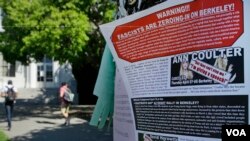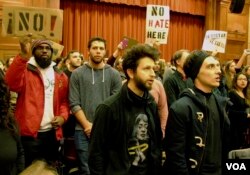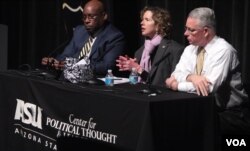Student Union
Should Only Some Speech Be Allowed on Campus?

Last month, a student group at Vermont’s Middlebury College invited Charles Murray, a political scientist and fellow at the prestigious conservative think tank American Enterprise Institute, to speak on campus.
Murray was greeted by hundreds of protesters who shouted over him when he tried to speak. As the crowd refused to let up, college administrators escorted Murray to another building where he conducted his talk, with Middlebury professor Allison Stanger, via livestream.
As Stanger and Murray left the building, they were “physically and violently confronted by a group of protesters,” college spokesman Bill Burger said in a statement.
Protesters “violently set upon [their] car, rocking it, pounding on it, jumping on and trying to prevent it from leaving campus,” Burger said.
Stanger was treated at a hospital emergency room and left wearing a neck brace following the violent confrontation with protesters, one of whom grabbed her by the hair and yanked her backward.
“I feared for my life,” Stanger later wrote in a post on Facebook.
Earlier this month, students at Claremont McKenna College in California targeted Heather Mac Donald, a Manhattan Institute scholar and prominent critic of the Black Lives Matter movement, with mob violence in response to her attempted speech.
MacDonald, who was also invited to speak on campus by a student group, saw protesters physically block the doors to the building where she was scheduled to speak. She was forced to deliver the speech via livestream, to a largely empty room, as the protesters refused to allow anyone to pass.
The protesters banged on windows and shouted from outside the building until “the cops decided that things were getting too chaotic and I should stop speaking," MacDonald later said of the incident.
Police officers then had to sneak MacDonald out the building’s back door so she could safely escape the protesters.
Following MacDonald’s doomed speech, more than two dozen students signed an open letter to one of the school’s president’s, David Oxtoby, assailing MacDonald as a “fascist” and a “white supremacist” and demanding Claremont “take action” against an independent student newspaper for its coverage of the protests and its “continual perpetuation of hate speech.”
“Why are you, and other persons in positions of power at these institutions, protecting a fascist and her hate speech and not students that are directly affected by her presence?” the students asked of Oxtoby.
Oxtoby had previously condemned the protests and defended MacDonald’s right to speak on campus, citing the college’s commitment to “the exercise of free speech and academic freedom.”
The students argued that MacDonald is a well-known figure, with her views well-documented, so refusing her a platform to speak didn’t violate her rights. Further, the students said, they consider MacDonald’s mere presence on campus “a form of violence.”
Incidents like the ones at Middlebury and Claremont have become increasingly common on American college campuses, according to Will Creeley, senior vice president of legal and public advocacy at the Foundation for Individual Rights in Education (FIRE), a group promoting free speech for college students.
“It’s deeply troubling,” he told VOA in an interview. “We have seen an unfortunate outbreak of violence in response to controversial speakers on campus.”
He said the violence is driven largely by a perceived lack of consequences for violent actors and a lack of knowledge among students of basic speech laws in the United States.
“Capitulating to threats of violence only goes to further embolden that illiberal response,” Creeley said. “Violence at these events will beget more violence and we are seriously concerned that someone is going to get hurt.”
In a 2015 YouGov survey, 43 percent of students said, “Making sure that students have an environment free from discrimination, even if that means placing some limits on what students can say” should be more of a priority for colleges than protecting the “absolute right to free speech.”
A similar 2016 survey conducted by Gallup shows that, by a 52 percent to 42 percent margin, students believe that their institution should forbid people from speaking on campus who have a history of engaging in “hate speech.”
But, as Creeley told VOA, “there is no hate speech exception to the First Amendment.
“There is an unfortunately prevalent problem of students being unaware of the extent of their rights and the rights of their peers,” he said.
This discussion over First Amendment rights came to a head this week when the University of California-Berkeley preemptively cancelled a scheduled speaking event by conservative provocateur Ann Coulter, citing concerns that the school couldn’t control a potentially violent reaction to Coulter’s presence.
The cancellation followed several violent incidents on the Berkeley campus this year, including a riot in February when far-right journalist Milo Yiannopoulos was invited to speak. That incident resulted in more than $100,000 of damage to buildings on campus.
The school’s decision to cancel Coulter touched off a firestorm of controversy, leading Berkeley to reverse its move and reschedule Coulter’s talk at a time when less people would be on campus. This didn’t sit well with the student group that invited Coulter to campus, so, on Monday, they filed a lawsuit against the school alleging discrimination against the speaker.
“This case arises from efforts by one of California’s leading public universities, UC Berkeley – once known as the “birthplace of the Free Speech Movement” – to restrict and stifle the speech of conservative students whose voices fall beyond the campus political orthodoxy,” the lawsuit, filed by Harmeet Dhillon on behalf of the Berkeley College Republicans, reads.
A spokeswoman for the school, Diane Klein, called the allegation that Coulter is being unfairly punished for her political point of view “untrue.”
“The university welcomes speakers of all political viewpoints and is committed to providing a forum to enable Ann Coulter to speak on the Berkeley campus,” she said in a statement.
The university offered to let Coulter speak May 2, but Dhillon said this time slot is unacceptable, because students will be studying for finals.
Please leave a comment here, and visit us on Facebook, Twitter, Instagram and LinkedIn, thanks!
See all News Updates of the Day
- By VOA News
Competition grows for international students eyeing Yale

It’s tough to gain admission to Yale University, and it’s getting even tougher for international students as standout students from around the world set their sights on Yale.
The Yale Dale News, the campus newspaper, takes a look at the situation here.
- By VOA News
Student from Ethiopia says Whitman College culture made it easy to settle in

Ruth Chane, a computer science major from Ethiopia, writes about her experiences settling into student life at Whitman College in the U.S. state of Washington.
"The community at Whitman College made sure I felt welcomed even before I stepped foot on campus," she says.
- By VOA News
Claremont Colleges student gets a shock when she heads home to Shanghai

In The Student Life, the student newspaper for the Claremont Colleges, a consortium of five liberal art colleges and two graduate schools in Claremont, California, student Rochelle Lu writes about readjusting to her Shanghai home after spending a semester in the United States.
- By VOA News
Cedarville University aims to ease transition for international students

Cedarville University in the U.S. state of Ohio says it’s got more than 140 international students representing 44 countries.
Here, the school interviews Jonathan Sutton, director of international student services. He talks about his job and the opportunities for international students on campus.
- By VOA News
Morehouse College offers prospective students tips on applying and thriving

Morehouse College, a private, historically Black liberal arts college in the U.S. state of Georgia, offers a guide for international students interested in attending the school.
Among the tips to apply and thrive at Morehouse:
- Take advantage of the school’s orientation program
- Turn to the school’s Center for Academic Success for tutoring, support and more
- Immerse yourself in campus life via clubs and societies
- By Reuters
US reviews Columbia University contracts, grants over antisemitism allegations

The administration of President Donald Trump said on Monday it will review Columbia University's federal contracts and grants over allegations of antisemitism, which it says the educational institution has shown inaction in tackling.
Rights advocates note rising antisemitism, Islamophobia and anti-Arab bias since U.S. ally Israel's devastating military assault on Gaza began after Palestinian Hamas militants' deadly October 2023 attack.
The Justice Department said a month ago it formed a task force to fight antisemitism. The U.S. Departments of Health and Education and the General Services Administration jointly made the review announcement on Monday.
"The Federal Government's Task Force to Combat Anti-Semitism is considering Stop Work Orders for $51.4 million in contracts between Columbia University and the Federal Government," the joint statement said.
The agencies said no contracting actions had been taken yet.
"The task force will also conduct a comprehensive review of the more than $5 billion in federal grant commitments to Columbia University."
The agencies did not respond to requests for comment on whether there were similar reviews over allegations of Islamophobia and anti-Arab bias.
Columbia had no immediate comment. It previously said it made efforts to tackle antisemitism.
College protests
Trump has signed an executive order to combat antisemitism and pledged to deport non-citizen college students and others who took part in pro-Palestinian protests.
Columbia was at the center of college protests in which demonstrators demanded an end to U.S. support for Israel due to the humanitarian crisis caused by Israel's assault on Gaza. There were allegations of antisemitism and Islamophobia in protests and counter-protests.
During last summer's demonstrations around the country, classes were canceled, some university administrators resigned and student protesters were suspended and arrested.
While the intensity of protests has decreased in recent months, there were some demonstrations last week in New York after the expulsion of two students at Columbia University-affiliated Barnard College and after New York Governor Kathy Hochul ordered the removal of a Palestinian studies job listing at Hunter College.
A third student at Barnard College has since been expelled, this one related to the occupation of the Hamilton Hall building at Columbia last year.
Canada’s immigration overhaul signals global shift in student migration
From Europe to North America, nations are tightening their immigration policies. Now Canada, long seen as one of the world's most welcoming nations, has introduced sweeping changes affecting international students. The reforms highlight a growing global trend toward more restrictive immigration policies. Arzouma Kompaore reports from Calgary.
Trump administration opens antisemitism inquiries at 5 colleges, including Columbia and Berkeley

The Trump administration is opening new investigations into allegations of antisemitism at five U.S. universities including Columbia and the University of California, Berkeley, the Education Department announced Monday.
It's part of President Donald Trump's promise to take a tougher stance against campus antisemitism and deal out harsher penalties than the Biden administration, which settled a flurry of cases with universities in its final weeks. It comes the same day the Justice Department announced a new task force to root out antisemitism on college campuses.
In an order signed last week, Trump called for aggressive action to fight anti-Jewish bias on campuses, including the deportation of foreign students who have participated in pro-Palestinian protests.
Along with Columbia and Berkeley, the department is now investigating the University of Minnesota, Northwestern University and Portland State University. The cases were opened using the department's power to launch its own civil rights reviews, unlike the majority of investigations, which stem from complaints.
Messages seeking comment were left with all five universities.
A statement from the Education Department criticized colleges for tolerating antisemitism after Hamas' Oct. 7, 2023, attack on Israel and a wave of pro-Palestinian protests that followed. It also criticized the Biden administration for negotiating "toothless" resolutions that failed to hold schools accountable.
"Today, the Department is putting universities, colleges, and K-12 schools on notice: this administration will not tolerate continued institutional indifference to the wellbeing of Jewish students on American campuses," said Craig Trainor, the agency's acting assistant secretary for civil rights.
The department didn't provide details about the inquiries or how it decided which schools are being targeted. Presidents of Columbia and Northwestern were among those called to testify on Capitol Hill last year as Republicans sought accountability for allegations of antisemitism. The hearings contributed to the resignation of multiple university presidents, including Columbia's Minouche Shafik.
An October report from House Republicans accused Columbia of failing to punish pro-Palestinian students who took over a campus building, and it called Northwestern's negotiations with student protesters a "stunning capitulation."
House Republicans applauded the new investigations. Representative Tim Walberg, chair of the Education and Workforce Committee, said he was "glad that we finally have an administration who is taking action to protect Jewish students."
Trump's order also calls for a full review of antisemitism complaints filed with the Education Department since Oct. 7, 2023, including pending and resolved cases from the Biden administration. It encourages the Justice Department to take action to enforce civil rights laws.
Last week's order drew backlash from civil rights groups who said it violated First Amendment rights that protect political speech.
The new task force announced Monday includes the Justice and Education departments along with Health and Human Services.
"The Department takes seriously our responsibility to eradicate this hatred wherever it is found," said Leo Terrell, assistant attorney general for civil rights. "The Task Force to Combat Anti-Semitism is the first step in giving life to President Trump's renewed commitment to ending anti-Semitism in our schools."
- By VOA News
STEM, business top subjects for international students

The Times of India breaks down the most popular subjects for international students to study in the U.S.
STEM and business lead the pack. Read the full story here. (January 2025)
- By VOA News
Safety and visa difficulties among misconceptions about US colleges

U.S. News & World report addresses some of the misconceptions about U.S. colleges and universities, including the difficulty of getting a visa.
Read the full story here. (January 2025)
- By VOA News
Work opportunities help draw international students to US schools

US News & World Report details the three top factors in foreign students' decision to study in the U.S. They include research opportunities and the reputation of U.S. degrees. Read the full story here. (December 2024)
- By VOA News
British student talks about her culture shock in Ohio

A British student who did a year abroad at Bowling Green State University in Ohio talks about adjusting to life in America in a TikTok video, Newsweek magazine reports.
Among the biggest surprises? Portion sizes, jaywalking laws and dorm room beds.
Read the full story here. (December 2024)
- By VOA News
Harvard's Chan School tells international students what to expect

Harvard's T.H. Chan School of Public Health reaches out to international students by detailing the international student experience at the school.
Learn more about housing, life in Boston and more here.
- By Reuters
China unveils plan to build 'strong education nation' by 2035

China issued its first national action plan to build a "strong education nation" by 2035, which it said would help coordinate its education development, improve efficiencies in innovation and build a "strong country."
The plan, issued Sunday by the Communist Party's central committee and the State Council, aims to establish a "high quality education system" with accessibility and quality "among the best in the world."
The announcement was made after data on Friday showed China's population fell for a third consecutive year in 2024, with the number of deaths outpacing a slight increase in births, and experts cautioning that the downturn will worsen in the coming years.
High childcare and education costs have been a key factor for many young Chinese opting out of having children, at a time when many face uncertainty over their job prospects amid sluggish economic growth.
"By 2035, an education power will be built," the official Xinhua news agency said, adding that China would explore gradually expanding the scope of free education, increase "high-quality" undergraduate enrolment, expand postgraduate education, and raise the proportion of doctoral students.
The plan aims to promote "healthy growth and all-round development of students," making sure primary and secondary school students have at least two hours of physical activity daily, to effectively control the myopia, or nearsightedness, and obesity rates.
"Popularizing" mental health education and establishing a national student mental health monitoring and early warning system would also be implemented, it said.
It also aims to narrow the gap between urban and rural areas to improve the operating conditions of small-scale rural schools and improve the care system for children with disabilities and those belonging to agricultural migrant populations.
The plan also aims to steadily increase the supply of kindergarten places and the accessibility of preschool education.
- By VOA News
A look at financial aid options for international graduate students in US

The Open Notebook, a site focusing on educating journalists who cover science, has complied a list of U.S. graduate program financial aid information for international students.









